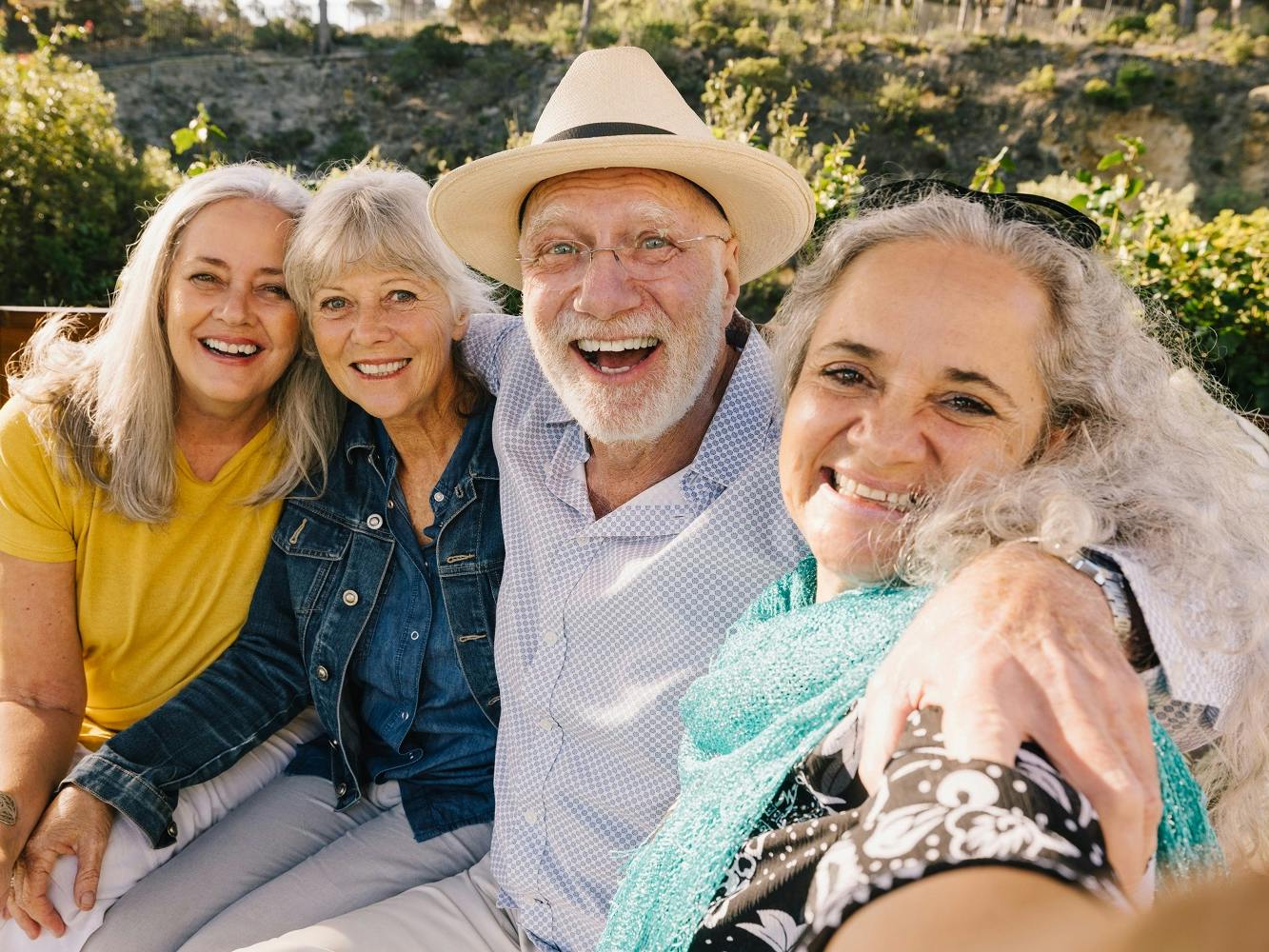
Strong friendships have been proven to boost both physical and mental health - even after you retire.
When you were a kid, making a new friend was probably pretty easy. Sometimes all you had to do was walk up to another kid and say, “Hi. You wanna play?”
It’s usually not so straightforward for adults. And it seems to only get harder as you go through life’s stages.
When you were working, you probably met new people regularly. And many of your co-workers probably became friends in time. Now that you’ve retired, socializing may no longer be an automatic part of your day.
But even if socializing is harder now, it’s important to make the effort. Research shows that social disconnectedness and isolation are linked to worsening physical health and mental health. But when you’re able to have strong relationships, good things tend to follow.
In addition to companionship, friends can help you stick with healthy behaviors such as staying active, says Irene S. Levine, Ph.D., a psychologist and friendship expert based in Pleasantville, New York. She’s the author of Best Friends Forever: Surviving a Breakup with Your Best Friend.
Friends can also support each other in other ways that impact their health, Levine says. For example, a friend can support you if you’re trying to quit smoking or make other healthy choices.
“The need for close friendships never abates,” she says. “Friends allow us to feel part of something larger than ourselves, and they enrich our lives.”
And try not to let this common obstacle get in your way: “Many people fall prey to the myth that everyone already has all their friends. But friendships are dynamic,” Levine says. “Particularly in the senior years. Good friends may move. They may become consumed with health problems or pass away. Because most friendships, even very good ones, don’t last forever, people are often open to new ones.”
Ready to get out there and expand your circle? These six tips can get you started.
1. Identify your interests and find kindred spirits
Do you like to play golf or tennis? Or do you enjoy hobbies like photography or woodworking? Whatever your interests are, try joining groups related to them. Or consider taking a class in something you’d like to learn more about.
You’ll have an instant connection with others through your shared interest. And you may learn something new. “When you see people on a regular basis in a class or group, it’s easier to determine who might be friend-worthy,” Levine says.
To find local groups and classes, try starting with your local library. It probably has a book club — or several. It may have information about other groups around town too.
Your local parks and recreation department is another good place to look. It will often have fitness classes for all ages, with options that range from ballroom dancing to yoga. Many also offer classes for learning new skills, such as how to play the ukulele or how to set up a computer.
You might find fitness or adult learning programs through local colleges as well.
One thing to keep in mind: When you meet new people, be patient and don’t try to become too intimate or familiar too quickly. It takes time for two people to get to know each other and “build a sense of trust that allows them to reveal their true selves,” Levine says.
If someone doesn’t respond the way you hoped, don’t take it personally. There could be many explanations. Maybe they’re preoccupied or are having a bad day. Or maybe they don’t feel well. Shrug it off and move on to someone else, Levine suggests. Or try again another time.
Related reading: Why You Need a Hobby — Plus 7 You Can Master Right Now
2. Volunteer for a cause you value
Devoting your time and energy to a cause you believe in can help you create meaningful connections. And you’ll likely see improvement in your health too.
Research has found that older adults who volunteer for 100 hours or more per year tend to be more active. A hundred hours may sound like a lot, but that’s only about eight hours a month, or two hours a week.
The 2020 study published in the American Journal of Preventive Medicine found that volunteers tend to have more positive moods and a greater sense of purpose in life. They also report more contact with friends and less loneliness and depression.
If you’ve never volunteered before, it can be hard to know where to start. Especially if there are several causes you care about.
If you like animals, your local animal shelter may be a good place to start. If you want to help kids, try reaching out to organizations like Big Brothers Big Sisters of America or your local school district. Art or history buffs should check with local museums, which may need volunteers. And if you like to cook, a local soup kitchen may be a good fit.
3. Join a community center
Becoming a member of a community group — whether it’s a faith-based organization or a recreational activity center — provides opportunities for group social engagement, which reduces loneliness and increases social support, research has found.
“These places offer a sense of community and also offer the opportunity to get to know people informally before you try to connect more personally,” Levine says.
4. Explore your neighborhood
If you regularly walk or ride a bike through your community, you’ll come across other people who are doing the same thing.
“When you walk in your neighborhood, be friendly, smile, and engage another person in conversation,” Levine suggests.
Introduce yourself to people in your orbit by identifying yourself by what you have in common: You might say, “I’m your neighbor three houses down.” Or “I really enjoy walking along this path. Where else do you like to walk?”
“If you start with something you have in common,” Levine says, “you’ll have immediate fodder for conversation.” Over time, these familiar strangers may become acquaintances and eventually friends.
5. Stay open-minded
“Don’t pigeonhole yourself into looking for new friends who are just like you,” Levine cautions.
Through community activities and hobbies, you may be able to connect with people from other cultures and backgrounds or those who are of different ages.
“Not only does this broaden the universe of potential friends,” Levine says, “but it can broaden your perspective.”
6. Connect with people from your past
“Reach back into your address book and reconnect with people from your past whom you remember fondly,” Levine suggests. “These are people with whom you have a shared history that can make the years of absence disappear.”
Call them up or send them an email and share a memory or a dream you had about them or an old photo you came across. Before you know it, you may be on your way to rekindling a friendship.
Additional resources
- ClearMatch Medicare: Find a Medicare Plan
- National Library of Medicine: Volunteering and Subsequent Health and Well-being in Older Adults
- National Library of Medicine: A Case Study Exploring the Impact of Community on Social Wellbeing of Older Adults
- National Library of Medicine: Friendship in Later Life


